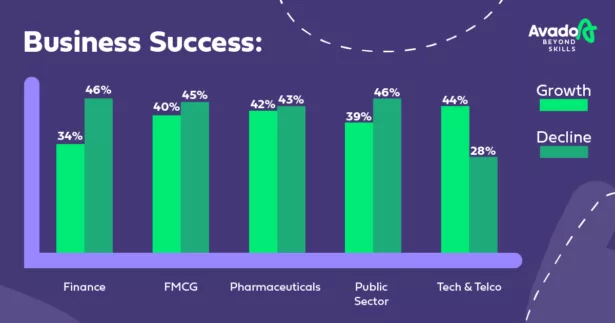HR training, delivered seamlessly online for busy professionals
Over the past few months, we surveyed more than 1,000 executives and senior leaders across several sectors. Based on our findings, we launched the Beyond Skills report, which aims was to assess the growing capability chasm. According to our research, that chasm was identified by 60% of respondents as a real problem in their organisation. But does capability chasm mean? At Avado, we define it as the critical imbalance between the capabilities people need and the ones they actually have.
A lot of businesses faced change through 2020. Following that change, we mapped how the capability chasm compares to the changing attitudes around learning and development. We found, unsurprisingly, that developing peoples’ capabilities is essential to business success. That was backed up by our finding that 71% of businesses that saw growth last year did increase their training budgets.
But how does this information specifically apply to the capabilities chasm in government and public services sector? Read on to find out.
What the Beyond Skills report highlighted for government and public services sector?
Government and public services were challenged like never before in 2020, having to halt non-essential services and prioritise front-line needs. Because of this, it is no surprise that the industry saw relatively poor growth. The sector did increase training budgets regardless of financial difficulties, but lack of time was named as the largest barrier to uptake.

It is imperative for the organisations in the government and public services sector to develop a more future-focused mindset and transition away from this survival shift. They need to evaluate the capabilities that will help them survive in 2021 and beyond.
How does financial services differ from other industries?
The other four industries we surveyed had both similar and different opinions surrounding the capabilities chasm.
- Fast-moving consumer goods respondents were the least likely to report a prioritisation of survival over capability at 59%.
- While financial services respondents reported the most cuts to training budgets at 51%, tech and telco reported the least, at 33%.
- Pharma had the smallest reported capabilities gap of any of the five sectors we surveyed.
- As with government and public sector, 46% of financial services respondents reported decline rather than growth.
What should you do next?
Right now, like in many sectors, organisations in the government and public services struggle with defining their new normal. Whether the majority of teams are working from home, in office, or a blend of the two in a hybrid environment, you need to make sure you’re ready to equip your people for that new approach. You’ll need the right technology, investments in people’s well being, robust employee data and, of course, a solid learning and development strategy.
Separate from our Beyond Skills report, we also surveyed more than 360 recent graduates and found that 61% are keen to work in the public services sector. That means there are going to be a lot of talented young people looking for jobs in the sector. If your current people aren’t acquiring the skills they need, they’ll be even more likely to get left behind. As well, from an organisational perspective, it’s important to show those possible new hires that you care about your people and are prepared to invest in their skills.
Demands on employees in the government and public services space are likely to increase as we recover from the pandemic. Customer expectations are also rising as people demand better online access to public services and a more personalised, seamless digital experience. Organisations in this sector need to respond to these ongoing challenges. Building digital capabilities, adopting a more customer-centric approach, and staying adaptable will ensure future success.
About Avado
At Avado, we believe that true transformation isn’t digital, it’s human. We build professional future skills to help diverse talent access and accelerate careers through award-winning learning experiences that deliver tangible and measurable impact. We upskill people, uplift culture and future-proof organisations in a fast-moving world.
Avado is proud to be a people-transformation partner to some of the largest and most innovative organisations in the UK including: Google, BT, NHS, British Airways, UK Civil Service, Legal & General and AstraZeneca.
To find out more, visit www.avadolearning.com
 4 min read
4 min read 



